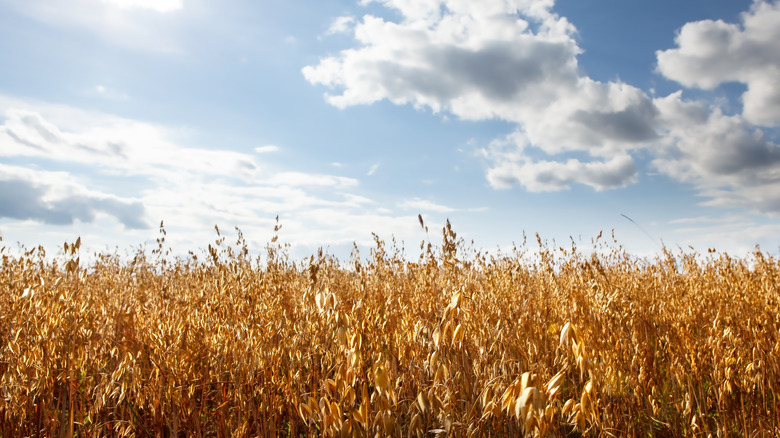If You've Been Having Trouble Finding Oatmeal You're Not Alone
If you're a fan of oatmeal, oat milk, and other oat products such as granola bars, then you're not alone: Oats, a staple grain most of us have probably been enjoying since childhood, have steadily been climbing in popularity over the past few decades. According to Statista, in 2000 the average American consumed an average of 4.4 pounds of oat products, with that number up to 4.9 pounds by 2019, and ReportLinker writes that since 2016, 70% of the new cereals to hit the market in Europe have been oat-based.
Part of oats' popularity is undoubtedly owed to the growing dietary preference for gluten-free products, as the grain is naturally free of gluten (via Beyond Celiac). But, whether shoppers are looking for oats as an alternative to wheat or simply because they like them, both categories of consumers are likely to be frustrated at the supermarket these days. According to Food Business News, there's a shortage of oats on the market right now that's also causing the price of the grain to go up.
A severe drought in oat-growing regions caused dipping supplies
If oats are regularly among your purchases at the grocery store, you may have noticed either short supply of the grain, higher prices, or both. According to Food Business News, that's because North American oat-growing regions experienced severe drought last year, leading to a smaller harvest that was outpaced by increasing demand.
"I've never seen anything like this in my 40 years of working in the oat industry," Randy Strychar, president of the oat market analyst firm Oatinformation, said at the food industry media company Sosland Publishing's 45th annual Purchasing Seminar earlier in June 2022. Strychar noted that interest in oats for their gluten-free properties, as well as their use in popular plant-based milks, has caused demand for the grain to go up, and is also driving up prices for oats — which, of course, is good news for oat producers, though it might be bad news for oat consumers.
"The bottoms are in, and prices are only going up from here," Strychar said at the seminar. He added that next year's oat harvest might well be uncertain, too. While last year's droughts disrupted the oat harvest and subsequent supply, heavy snowfall over the winter moistened the soil in those regions — perhaps too much, causing late oat seeding this year that could result in average oat production at best. So, the next time you spot your favorite oat product at the store, you might want to stock up.

